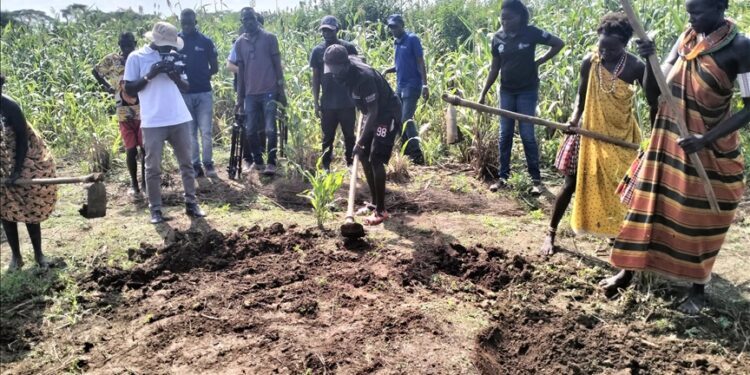- ‘This dry spell has been devastating for my family’s farm … My children go to bed hungry, and I worry about their health and future,’ says local farmer Adele Losike
JUBA, South Sudan
In South Sudan’s Eastern Equatoria state, the worsening climate crisis has brought erratic rainfall, extended droughts, and extreme weather events, significantly affecting food security across the region.
These shocks, along with an invasion of birds, have disrupted agricultural activities, reduced crop yields, and intensified food shortages, leaving communities vulnerable to hunger and malnutrition.
With crops failing and limited sources of income, many families are resorting to selling firewood and producing charcoal as their only means of sustaining themselves.
For many, like Nakai Lotor, a mother of three, the impact has been devastating.
“The birds destroyed my entire crops. I cultivated my farm, hoping for a good harvest, but I was left with nothing,” she told Anadolu. “Now, I have nothing to eat in my house. My two children are malnourished. I survive by selling firewood and burning charcoal.”
Without this source of income, she added, it would be nearly impossible for her to provide food for her children.
“My daily routine is to burn charcoal and take it to the market. After selling, I use the money to buy food. That’s how we’ve been surviving since my farm didn’t yield anything,” she explained.
Adele Losike, another mother of two, echoed Lotor’s struggles. Her children were diagnosed with malnutrition due to a lack of proper food after her farm’s crops failed.
“This dry spell has been devastating for my family’s farm. We rely on the rains to water our crops and sustain our livelihood, but this year, the skies have remained stubbornly clear. Our fields, once lush with greenery, now lie barren and cracked,” she said.
Losike described how her family’s entire way of life had been disrupted, forcing her to find alternative ways to survive: “The impact is more than just financial loss. My children go to bed hungry, and I worry about their health and future.”
Struggles of farmers amid drought and climate shocks
For many farmers in Eastern Equatoria, the prolonged drought has wiped out their harvests and left them with few options.
Lokai Jonezio Ejula, a father of three and a farmer in the state’s Kapoeta North area, described how his community has been struggling.
“Our community has been facing an unprecedented dry spell that has severely affected our agricultural activities and livelihoods. Normally, this area is known for its fertile soil and reliable rains, but for the past several months, we have seen very little rainfall,” he told Anadolu.
“The lack of rain has had a devastating impact on our crops. Many of the plants are wilting, and those that aren’t have stunted growth due to insufficient moisture in the soil,” he added.
Despite these challenges, Ejula remains hopeful. He recalled that last year, the World Food Program (WFP) taught them new farming techniques, which helped them adapt.
“They taught us how to dig half-moon ditches and use other methods to capture water. We’ve also learned to use modern hoes to dig deeper into the soil, which has made a significant difference in crop yields this year,” he said.
Similarly, Maria Nanya, another resident, shared how life in Kapoeta has become extremely difficult due to climate shocks.
“People in Kapoeta struggle to feed their families because of the dry spell. Every year, we hope for a better harvest, but the conditions keep getting worse,” she said.
Nanya noted that with the support of UN agencies like WFP, they have received some assistance.
“This garden has really helped us fight hunger. In the past, we often went longer without food, but this year, cassava has helped us reduce hunger,” she said.
Broader impact of climate change
South Sudan is highly vulnerable to climate variability, and extreme weather events such as droughts, floods, and erratic rainfall patterns continue to pose serious challenges.
As these factors contribute to crop failures, reduced agricultural productivity, and loss of livestock, the latest Integrated Food Security Phase Classification (IPC) review, published late last year, estimated that by April, 57% of the population would be suffering from acute food insecurity.
Now, with the crisis worsening, international agencies have stepped in to help communities adapt to changing weather patterns.
Thiago Xavier, head of the WFP’s field office in Kapoeta, said the region has been struggling with shifting rainfall patterns. In response, WFP has introduced new farming techniques to help communities regenerate their soil and secure their livelihoods.
“These communities have been grappling with changing rainfall patterns over time. These techniques can help harvest and retain water, protecting them against climate impacts. This can help rehabilitate and regenerate the land,” he told Anadolu.
Xavier emphasized that these efforts are crucial in helping communities become more resilient to climate shocks.
“We call this ‘first aid for landscapes’ – it is emergency relief for the soil because that’s what the communities depend on for their livelihoods,” he said.
Louis Lobong Lojore, the governor of Eastern Equatoria state, acknowledged that food security in the region has been severely affected by multiple factors, including drought, pests, and flooding.
“If we talk about the Budi area and all the regions of the Toposa, food security is very poor due to droughts that have destroyed crops,” he told Anadolu.
“Additionally, there has been a lack of rain. In Lafon area, flooding has occurred, and the area of Lopit, part of one of the counties, has also been impacted by pests and birds. Some villages around Torit County and in Magwi County are also affected,” he said.
For now, Lojore emphasized, the state government is working with international agencies to address the crisis, both on a short- and long-term basis.






